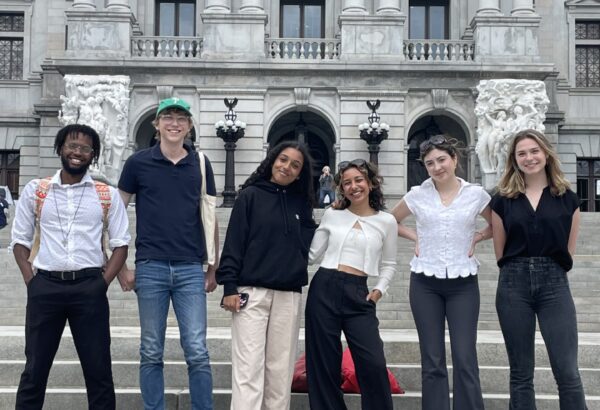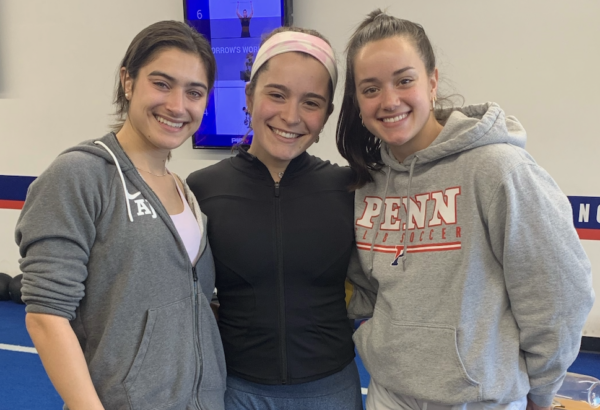The discussion explored how the Rule of Law is protected in constitutional systems around the world—including the United States—and how to ensure its survival when threatened by modern challenges. Moderated by Jeffrey Rosen, President of the National Constitution Center, the panel featured Garry Kasparov, chairman of the Renew Democracy Initiative, Judge Claudia Escobar, former magistrate of the Court of Appeals of Guatemala and distinguished visiting professor at the Schar School of Policy and Government at George Mason University—and legal experts Robert P. George and Kim Lane Scheppele of Princeton University.
In a series of questions posed by Jeffrey Rosen, the conversation covered the topic of Rule of Law in specific historic contexts as well as the role of the judiciary and constitutionalism in upholding Democracy. Garry Kasparov, a Russian dissident in exile and author of several books including, Winter is Coming, Why Vladimir Putin and the Enemies of the Free World Must Be Stopped, described how the Russian government and Putin’s regime violates the Rule of Law. Kasparov explained how the end of the cold war and the collapse of the Soviet Union was a moment of triumph that gave a sense of hope for a more democratic future. At the time, no one could predict that Putin, an ex-KGB Lieutenant Colonel, would become president of Russia and “skillfully use the weakness of Russian Democracy and the very fragile institutions” to make the situation worse than it was during the Soviet Union. “The Rule of Law is no longer in place in Russia,” said Kasparov, “Putin is challenging the very system of international law because he believes that the rulers have all the rights to control their territories, whether through communism or fascism. He has complete distaste for democracy and the Rule of Law because it limits those in power.” Later during the discussion, Jeffrey Rosen asked Kasparov about kleptocracy. Kasparov answered, “I believe that every dictatorship is kleptocratic, even the ideological dictatorship of the 20th century.” What has changed in the 21st century, according to Kasparov, is the free and unfree world are no longer separated by physical barriers such borders and the Berlin Wall. Instead, they are completely intertwined using technology, allowing attacks against freedom by dictatorships.
Professor Robert George, author of the article, “Reason, Freedom, and the Rule of Law,” provided his definition of the Rule of Law, “We have Rule of Law when the rulers are bound by the law. We lack the Rule of Law when the rulers can act arbitrarily.” He gave the example of the separation of power in the United States. The independent judiciary, legislative and executive branches of government were established to ensure that those holding office would stay within the “limits of the authority granted to them by the constitution.” Professor George went on to explain Ion Fuller’s eight elements of the Rule of Law that need to be in place for the Rule of Law to be effective.
The laws must be:
- promulgated or widely known
- generally applied to everyone
- reasonably clear
- prospective, not retrospective
- consistent
- compliance with the law has to be possible
- reasonably constant
- there must be a congruence between the actions of officials and stated rules
In summary, Professor George emphasized that the Rule of Law is not a guarantee of substantive justice, but without it, you have injustice. George said, “You need more than the Rule of Law, but you certainly need the Rule of Law” as a starting point.
Professor Kim Lane Scheppele reiterated George’s point that the Rule of Law is not enough to protect freedom, emphasizing that it is the process of how the law is written and enforced that assures a democratic system. “The Rule of Law is not sufficient. You must ask questions about how the law is produced. Is it produced in inclusive and fair and public deliberative process and does the law seriously constrain those who must live by it? Or are the laws arbitrary.” She went on to explain the difference between Rule of Law and Constitutionalism. “Constitutionalism says that even the leaders need to live under the law. Constitutionalism and Democracy are joined at the hip. They can’t operate without the Rule of Law, but the Rule of Law is not sufficient.”
Later in the conversation, Professor George reinforced Scheppele’s point about Constitutionalism stating, “In addition to a general understanding or ethos of the Rule of Law, and indeed to sustain the ethos over time, there needs to be constitutional structural constraints on power.” Anyone exercising power whether they be in the executive, legislative, or judicial branch of government needs to respect the Rule of Law.
Later in the conversation, Professor George reinforced Scheppele’s point about Constitutionalism stating, “In addition to a general understanding or ethos of the Rule of Law, and indeed to sustain the ethos over time, there needs to be constitutional structural constraints on power.” Anyone exercising power whether they be in the executive, legislative, or judicial branch of government needs to respect the Rule of Law.
To hear the full conversation or access the entire transcript you can watch the recorded event:




